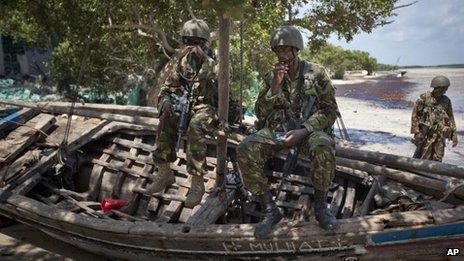Somali militants hold Kismayo under Kenyan force attack
- Published

Islamist militants in southern Somalia are holding onto the city of Kismayo, despite an African Union troop attack.
Kenyan and Somali forces launched a beach assault on al-Shabab's last major stronghold, but by late afternoon were still some miles from the city centre.
Clashes were reported just north of the city and residents report Kenyan shelling of al-Shabab positions.
Kenyan troops are part of a force trying to wrest control of the country for the new UN-backed president.
The BBC's Gabriel Gatehouse in Nairobi says it is probably a matter of when, not if Kismayo falls.
He says when it does, it will be a severe blow to the Islamists - Somalia's second largest port is a significant source of revenue for whoever controls it.
Al-Shabab, which is aligned to al-Qaeda, has used the port to bring in weapons and earn revenue.
The group's fighters are still highly active in much of the countryside in southern and central Somalia and have carried out suicide bombings and other attacks in cities they no longer control.
'Shelling'
Kenyan troops launched airborne and amphibious landings before dawn, supported by Somali government forces.
There was an early claim by the Kenyan military that parts of Kismayo had been captured and the rest was expected to fall soon.
However, by late afternoon residents said they could hear and see military aircraft overhead, but that inside Kismayo itself, al-Shabab was still in charge.
Most residents are staying indoors as the roads out of the town are closed. About 12,000 people have fled Kismayo in the past week, the United Nations refugee agency has estimated.
Al-Shabab is using its radio station to rally its forces and call on local people to join the fight.
The beach landing happened on the main road to Mogadishu to the north of the city, where al-Shabab spokesmen say they engaged in heavy fighting with the African Union (AU) forces.
The group told the BBC the attack had been rebuffed and none of the city had fallen.
"It is a lie that Kenyan troops have captured Kismayo. But what they have done was a cowardly act, which was that they brought in troops in four ships to try to capture the city," al-Shabab spokesman Abu Musab told the BBC Somali service.
"And they landed them about nine kilometres (six miles) to the north of the city. Our fighters clashed and attacked them and they are defending themselves where they landed," he said.
The Kismayo residents told the BBC they had seen no Kenyan or Somali government forces inside the city proper. They said that al-Shabab fighters have been gathering in a district in the north of the city - Buulu Abliko - which was shelled by AU troops.
An eyewitness in Kismayo hospital said he had seen wounded civilians there. Other accounts suggest one civilian has been killed and three others have been wounded.
One of al-Shabab's Twitter accounts tweeted a message at 11:12 GMT saying that two Kenyan armoured personnel carriers were destroyed by an improvised explosive device (IED) and a third one by a rocket propelled grenade (RPG).
Checkpoints have been set up on the main road north of Kismayo, with one eyewitness telling the BBC that the AU forces appeared to include white troops. There have been numerous reports of US special forces operating against the Islamist militants in Somalia.
However, the US Africa command said on Friday it was "not participating in Kenya's military activities in the region".
There have also been reports of helicopters attacking the city, which according to the UN has a population of about 80,000.
Kismayo has helped al-Shabab generate millions of dollars from charcoal exports, the UN says, despite a Security Council ban on countries buying such goods from Somalia.
African Union troops pushed al-Shabab from the capital, Mogadishu, in August 2011 and, along with other pro-government forces, have since taken control of most of the other towns previously in militants hands.
Kenya began its intervention in Somalia nearly a year ago after a spate of cross-border attacks blamed on al-Shabab.
Since the overthrow of President Siad Barre in 1991, Somalia has seen clan-based warlords, Islamist militants and its neighbours all battling for control.